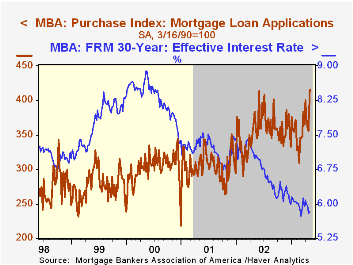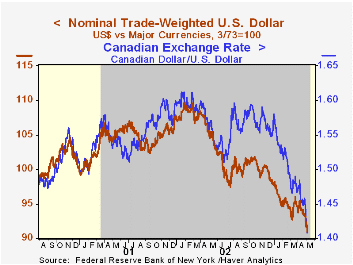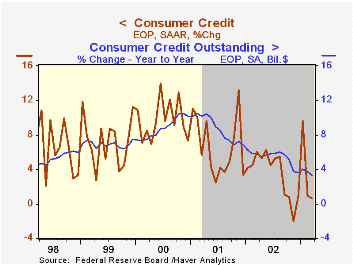 Global| May 07 2003
Global| May 07 2003Mortgage Applications Surged, Purchase Applications Set Record
by:Tom Moeller
|in:Economy in Brief
Summary
The index of mortgage applications compiled by the Mortgage Bankers Association jumped 18.6% last week and erased the declines of the three prior weeks. Despite the latest rise, applications were 25.5% below the peak level of mid- [...]

The index of mortgage applications compiled by the Mortgage Bankers Association jumped 18.6% last week and erased the declines of the three prior weeks. Despite the latest rise, applications were 25.5% below the peak level of mid-March.
Last week's increase was due to huge gains in mortgage applications both for home purchase and refinance. Mortgage applications for home purchase surged 16.9% (8.7% y/y) last week to a record high level.
During the last ten years there has been a 52% correlation between the y/y change in purchase applications and the change in new plus existing home sales.
Refinancing applications rose 19.4% w/w but nevertheless were off 35.3% from the March peak.
The average size of a mortgage loan application surged to $185,400 (-0.5% y/y). The average size of an application for home purchase fell slightly to $196,900 (+7.0% y/y). The average size of an application to refinance jumped 6.6% to $180,200 (-5.1% y/y).
Interest rates on a conventional 30-Year mortgage ticked up with the effective rate at 5.83% versus 5.80% the prior week. The effective rate on a 15-year mortgage was 5.21%.
Visit the Mortgage Bankers Association site at www.mbaa.org.
| MBA Mortgage Applications (3/16/90=100) | 5/02/03 | 4/25/03 | 2002 | 2001 | 2000 |
|---|---|---|---|---|---|
| Total Market Index | 1,246.6 | 1,050.8 | 799.7 | 625.6 | 322.7 |
| Purchase | 416.0 | 356.0 | 354.7 | 304.9 | 302.7 |
| Refinancing | 6,077.8 | 5,092.0 | 3,388.0 | 2,491.0 | 438.8 |
by Tom Moeller May 7, 2003

The US dollar has been under broad pressure due to little evidence that US interest rates will rise anytime soon. Yesterday's announcement by the FOMC dropped the trade weighted dollar's value another 0.6% versus major currencies. The dollar's decline is versus a peak early last year and now has come to 17%.
The Euro has been above parity with the US dollar since November of last year, but erratic gains extend back to late 2000. Since then the Euro is up by almost one third, 29% since early 2000.
Against the Canadian dollar the US currency has suffered declines not seen since the late 1980s. Since early last year the C$ is up roughly 12% with virtually all of that gain since last Winter.
Versus the Japanese Yen, the dollar has traded narrowly since the middle of last year. That followed dollar declines early in the year which came to over 10%.
Exchange rate puzzles are explored here by the Federal Reserve Bank of San Francisco.
The differing behavior of the US Federal Reserve System and the Eurosystem is explored by the Federal Reserve Bank of New York here.
Consumer Credit Usage Remained Weakby Tom Moeller May 7, 2003

Consumer credit outstanding (which excludes mortgages) rose $0.9B (0.6% AR) in March. Consensus expectations had been for a $3.0B rise.
The preliminary report of a $1.5B rise in February was revised down slightly to $1.3B. Revolving credit usage was revised down but a drop in nonrevolving was lessened.
Revolving credit rose 3.9% (AR) following a 5.9% February gain. The six month growth was a barely positive 1.0%.
Nonrevolving credit fell again in March, at a 1.7% rate following the 2.7% February decline.
| Consumer Credit Outstanding | Mar m/m | Feb m/m | Y/Y | 2002 | 2001 | 2000 |
|---|---|---|---|---|---|---|
| Total | $0.9B | $1.3B | 3.3% | 3.6% | 6.9% | 10.2% |
| Revolving | $2.3B | $3.6B | 2.4% | 1.6% | 5.1% | 11.6% |
| Nonrevolving | $-1.5B | $-2.2B | 3.8% | 5.0% | 8.2% | 9.1% |
Tom Moeller
AuthorMore in Author Profile »Prior to joining Haver Analytics in 2000, Mr. Moeller worked as the Economist at Chancellor Capital Management from 1985 to 1999. There, he developed comprehensive economic forecasts and interpreted economic data for equity and fixed income portfolio managers. Also at Chancellor, Mr. Moeller worked as an equity analyst and was responsible for researching and rating companies in the economically sensitive automobile and housing industries for investment in Chancellor’s equity portfolio. Prior to joining Chancellor, Mr. Moeller was an Economist at Citibank from 1979 to 1984. He also analyzed pricing behavior in the metals industry for the Council on Wage and Price Stability in Washington, D.C. In 1999, Mr. Moeller received the award for most accurate forecast from the Forecasters' Club of New York. From 1990 to 1992 he was President of the New York Association for Business Economists. Mr. Moeller earned an M.B.A. in Finance from Fordham University, where he graduated in 1987. He holds a Bachelor of Arts in Economics from George Washington University.
More Economy in Brief
 Global| Feb 05 2026
Global| Feb 05 2026Charts of the Week: Balanced Policy, Resilient Data and AI Narratives
by:Andrew Cates






